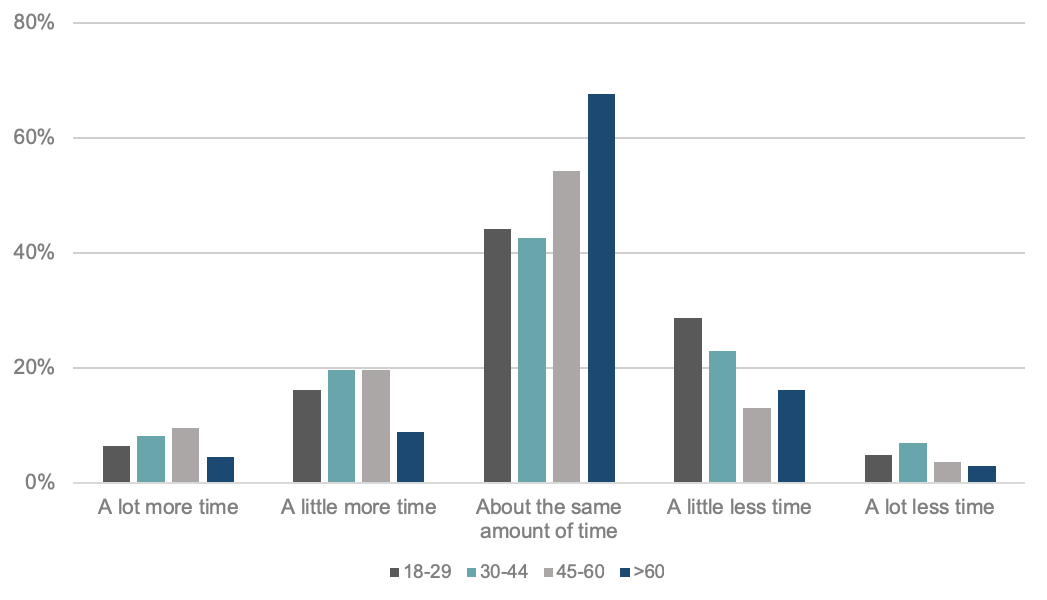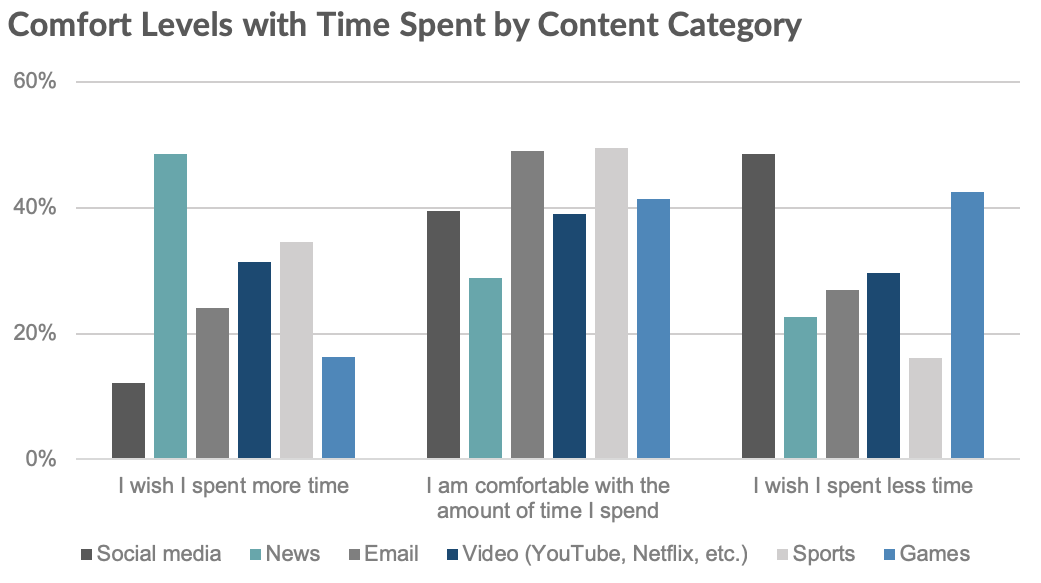The slow, deliberate wave of reducing tech addiction continues to roll forward according to our survey of 501 US smartphone users. The results make it clear that people are paying attention to how much time they spend on their devices, although only a minority expect to change their habits this year. This is consistent with our view that 2018 was a year of awareness for tech addiction and 2019 will be a year of early adopters taking action to reduce time with tech. Broader adjustments to device use will take time.
Apple’s Screen Time and Android’s Digital Wellbeing products are less than a year old, but 42% of respondents say they use the products. Of the 18-29-year-old respondents in our survey, 56% said they used one of the two tracking apps.
Do You Use Apple’s Screen Time or Android’s Digital Wellbeing App to Track How You Spend Time on Your Phone?

Despite a large cohort of smartphone users monitoring device usage, only 12% admitted being uncomfortable with the amount of time they spend on their device. 65% said they are comfortable (31% very comfortable). Users 30-44 years old overindexed most relative to the average with 22% of users saying they were uncomfortable with the amount of time on their phones. The 18-29-year-old group was next at 16% expressing discomfort.
Few users expressed being “very uncomfortable.” That description was only 1% of the total survey group and no age cohort exceeded 1% either. Embarrassment may be a factor in people expressing discomfort, particularly high discomfort, with their technology use.
How Comfortable Are You with the Amount of Time You Currently Spend on Your Smartphone?


When respondents were asked how they expect to change their device usage in the new year, 24% said they expect to use their phone less, indicating that even though users may not admit to being uncomfortable with their device use (only 12%), a meaningful portion of the population may desire to use their devices less. Of the users who said they are uncomfortable with the amount of time they spend on their smartphones, 66% expect to spend less time on their devices in 2019.
The difference between the group that expressed discomfort and the group that expects to use their devices less appears to come from the neutral comfort group — neither comfortable nor uncomfortable with device use. Of the neutral comfort group, 36% of users expect to reduce their device usage in 2019, while 15% expect to increase it and 49% expect it to stay the same. This demonstrates a desire among average users to reduce tech usage even if they aren’t willing to admit that they’re uncomfortable with how much they use their devices.
Do You Expect to Spend More or Less Time on Your Smartphone in 2019?

Similar to discomfort levels, younger users overindexed in terms of expecting to reduce device usage in 2019. The 18-29-year-old group overindexed most to the average with 34% of those respondents expecting to reduce device usage in 2019 (16% expressed discomfort with their device use). The 30-44-year-old group was next at 30% of the cohort expecting to reduce device use this year (22% expressed discomfort).
How Much Time Users Expect to Spend on Smartphones in 2019 by Age

We also asked users how they felt about the amount of time they spend with six content categories: social media, news, email, video, sports, and games. Social media and games showed the largest gap between users wanting to spend less time vs more, 48% vs 12% in the case of social media and 42% vs 16% in the case of games. News was the category with the most interest in the opposite direction — users wanting to spend more time with news vs less — at 48% more vs 23% less. Users seemed to be more even about their time with email and video.

We asked users what other tactics they’ve used to reduce device dependence. Over 43% of respondents said they’ve tried to reduce smartphone use at night or in the bedroom, while 27% have taken steps to eliminate social media, and another 27% have tried meditation. Reducing tech addiction will require a holistic approach that incorporates all of these tactics and more. While the market for tech addiction solutions is still early, the survey data shows that it is real and growing.
Disclaimer: We actively write about the themes in which we invest or may invest: virtual reality, augmented reality, artificial intelligence, and robotics. From time to time, we may write about companies that are in our portfolio. As managers of the portfolio, we may earn carried interest, management fees or other compensation from such portfolio. Content on this site including opinions on specific themes in technology, market estimates, and estimates and commentary regarding publicly traded or private companies is not intended for use in making any investment decisions and provided solely for informational purposes. We hold no obligation to update any of our projections and the content on this site should not be relied upon. We express no warranties about any estimates or opinions we make.
